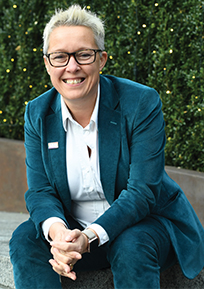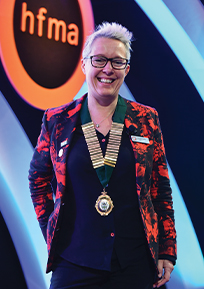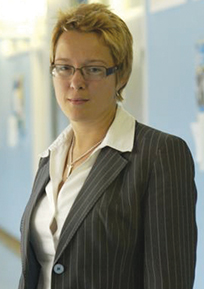HFMA president: taking pride in our future
 Caroline Clarke became group chief executive of the Royal Free London NHS Foundation Trust in February last year, capping an NHS finance career that has spanned nearly three decades. But as she takes on the role of the health finance profession’s leader, as HFMA president for 2020, she still sees finance as her ‘tribe’.
Caroline Clarke became group chief executive of the Royal Free London NHS Foundation Trust in February last year, capping an NHS finance career that has spanned nearly three decades. But as she takes on the role of the health finance profession’s leader, as HFMA president for 2020, she still sees finance as her ‘tribe’.
And it’s a tribe that she wants to take a bigger role in meeting the challenges facing the NHS – challenges that remain significant despite increased funding to support the NHS long-term plan.
‘The finance community can help with improving operational performance because it understands data and that measuring performance does matter,’ she says. ‘Colleagues look to us for objectivity and facts and to help make decisions.
‘You need to be able to quantify as well as narrate your way through a situation. Finance professionals have all sorts of professional capabilities and we should be using these skills in other parts of the service.’
This call for finance to take on a broader role forms part of Ms Clarke’s theme for her year in office – Taking pride in our future – a theme that reflects her view that people (clinical and non-clinical) are the key to meeting the service’s goals of developing more integrated care models.
She recognises that the current context for the NHS is tough, with the service facing extreme challenges. Demand continues to rise and there remain significant staffing shortages – along with the money to pay for them. Staff in all functions are hard pressed and the mood music – with record underperformance on performance targets – is gloomy. But despite this, Ms Clarke believes the real story is about improvement in the face of unprecedented pressure and believes the service should be optimistic about its future. ‘Because of the short-term pressures, it can be hard to market the NHS as a fantastic career – and it is a fantastic career. We should be really proud of what we do in the NHS and develop a sense of optimism about the future. That way, we might be able to shift some of the workforce issues.’
The Royal Free London provides a good example of the wider NHS position. On the face of it, the trust has some major challenges. Last year the Care Quality Commission downgraded its overall assessment of the trust from good to requires improvement. It is struggling with A&E performance, with just 79.5% of all patients seen within four hours in the third quarter of this year, compared with a target of 95%.
In 2018/19, it was not in a position to agree a control total. This meant it did not receive sustainability funding and reported a deficit of £67m. This year, it is on course to hit a £30m deficit control total. But strip out the sustainability funding and non-recurrent savings and it is still carrying an underlying deficit of more than £70m. It also remains reliant on loans to maintain positive cash balances – with cumulative borrowing of £170m repayable over the next few years.
Despite this, the trust is doing lots of the right things. Strategic partners with the Institute of Health Improvement, it has introduced a systematic approach to reviewing patient pathways to reduce unwarranted clinical variation. Twenty clinical pathway groups (CPG) were set up last year and there are plans to expand this to 60. Increasing numbers of its staff are trained in improvement science and there have been real benefits for patients – reducing the length of stay for hip and knee replacements, for example, and major improvements on continuity of carer for maternity services.
Importantly, this is being done at scale and embedded as a new way of working. Significant reductions in demand as patients are treated in more appropriate settings, and with more efficient processes, mean that overall costs to the system will reduce.
Digital role model
The trust – which is effectively testing a group model on behalf of the wider NHS (see Track record) – also opened the new £200m Chase Farm Hospital on budget and on time. This provides one of the country’s most digitally advanced hospitals. And the trust has embraced the wider digital revolution too, with an electronic patient record in two of its flagship hospitals. This underpins the CPG programme, providing decision support for clinicians.
On finance, there are also positives. The trust’s reference costs have been consistently below the national average. And that underlying deficit – as large as it is, fuelled by a tariff set below providers’ actual costs for years – has reduced by some £50m in just a couple of years.
‘The story internally is one of improvement,’ says Ms Clarke. ‘We are absolutely on the right track and in the current context, we have to describe the journey around relative improvements as well as binary targets.
Leaders across the NHS have a major role in getting this improvement message across. Staff are working extremely hard and their efforts need to be recognised and celebrated, even though the pressures on the service remain significant, she believes.
There are roles for the centre too. Increased long-term funding for social care, merged health and social care budgets and better policies on long-term financing are the key requests from Ms Clarke. But locally, the focus has to be on supporting and developing staff and being clear that their efforts are making a real difference.
Her theme – Taking pride in our future – is focused completely in this area. In December, Future-Focused Finance, the HFMA and consultancy PwC published Designing our future, which starts to set out a vision for the NHS finance function. This report (see Healthcare Finance, December 2019) is at the heart of a wide consultation exercise that is now under way with finance staff, with a view to publishing a final report later this year.
It explores the impact of new technology as the function embraces cloud computing, blockchain, artificial intelligence (AI) and robotic process automation, and it looks at how roles will need to change to support the transforming NHS. As fewer people are needed for transactional processing, more finance staff will be free to move into business partnering roles – critical for delivering the value agenda.
‘We are going to make a career in NHS finance the best there is, and we’re going to do it together, and when we look back, we’re going to be proud of what we’ve done,’ she told December’s HFMA annual conference. Mapping out what the future could look like within finance teams will be essential if finance teams are to be in the best possible condition to add value. ‘We have people working for us now who will be finance directors in 30 years’ time,’ she says. ‘We need to think about what the world will look like for them and how we get people ready for that.
‘Finance staff need to be on top of the idea of using multiple sources of data and being really clear about what data is telling us,’ she continues. ‘They need to be guiding decision making in organisations – right there at the table and often leading it.’
She takes issue with the portrayal of finance only as a support function. ‘There is a whole raft of people, who because they’ve gone into a technical profession, don’t see themselves as leaders. But we are leaders. You only need to look around at the HFMA annual conference to see the capability in the room. We have something really special in the finance community.’
But she adds that finance will need to embrace changes in its own operation, which will involve adopting technology for transactional processing and sharing services where that makes sense. Letting go of transactional responsibilities will free up time to provide more analysis and understanding of what is happening in the business.
‘So we need to make ourselves invaluable – and we do this by being a bit broader,’ she says. ‘There is definitely room for centres of excellence and people being experts at tax or the capitation formula or whatever. But for business partners and the vast majority of finance managers, you have to have a broader outlook, be able to use multiple data sets and think about data science and technology. And you will need to have a new set of skills – even if we don’t yet know what all those skills will be!’
Ms Clarke wants finance to be fully engaged in helping the NHS meet its wider people challenge too. ‘In the next 10 years, the NHS will potentially need 250,000 new members of staff if we do nothing,’ she says, suggesting that the solution will lie in innovative thinking as much as straightforward recruitment.
Attracting staff
Attracting new staff and retaining existing workers is clearly the ‘number one priority’ and ‘the most important part of the long-term plan’. Technology will provide part of the solution. For example, a recent study involving researchers from Google Health and Imperial College London showed that an AI model was as good as the current two-doctor system of reading mammograms and better than using a single doctor to spot cancer. With an estimated shortage of more than 1,000 radiologists across the UK, this could help increase capacity by a different route.
Ms Clarke believes that finance staff have a big part to play in asking hard questions about why things are done in a particular way, or sometimes why things are done at all. And she is clear that the more diverse the finance function becomes, the better able it will be to meet this challenge.
‘The function needs to reflect the population,’ she says. ‘The business case for diversity is really strong. When you have cognitive diversity, which comes from having people around the table who don’t look the same or haven’t grown up in the same way, you get better solutions. I am completely sold on that.’
The challenge is making this happen. Future-Focused Finance is leading work to improve diversity in senior finance leadership roles. The last finance staff census, due to be updated shortly, revealed that women account for 61% of the finance function, but just 28% of finance directors. And 18% of the finance workforce are from a black, Asian and minority ethnic (BAME) background, while only 4% of director level positions are held by BAME employees.
‘We need to use the diversity of our populations to bring diversity of thought and approach to our problems,’ says Ms Clarke. ‘If we continue to look at things in the old ways, we will miss the new solutions.’ There is no one single solution. Instead, improving diversity will take lots of small steps – more targeted recruitment and more work getting people ready for senior roles, for example. And in many cases it will be something that organisations have to do for themselves.
‘A lot of this has to be done locally as it is about local culture,’ she says, but adds that the centre’s role could be to showcase departments that have made themselves more inclusive.
Ms Clarke’s year as president also coincides with the HFMA’s 70th anniversary – a birthday she is keen to point out the association shares with NATO, Stevie Wonder and Snoopy. However, she is determinedly looking forward with her presidential theme. She wants finance staff to fulfil their potential, broaden their role and take pride in their contribution to delivering high-quality, sustainable healthcare. That has to be something worth celebrating.
Track record
 An economics graduate from the London School of Economics, new HFMA president Caroline Clarke joined the NHS on the national finance training scheme in 1991.Her NHS career to date is bookended by the Royal Free London NHS Trust. In an early placement on the training scheme at Hampstead Health Authority, she was involved with work to establish the hospital as a freestanding NHS trust. She was to return to the organisation (by now a foundation trust) as finance director some 20 years later.
An economics graduate from the London School of Economics, new HFMA president Caroline Clarke joined the NHS on the national finance training scheme in 1991.Her NHS career to date is bookended by the Royal Free London NHS Trust. In an early placement on the training scheme at Hampstead Health Authority, she was involved with work to establish the hospital as a freestanding NHS trust. She was to return to the organisation (by now a foundation trust) as finance director some 20 years later.
She got an early insight into the role of HFMA leader in her first substantive job at Kensington, Chelsea and Westminster Health Authority. She worked under finance director Keith Ford, who himself spent a year as HFMA national chairman during her time at the authority. Naming Mr Ford as a major influence, she was impressed with his ability to influence policymakers and his readiness to take informed risks, with a credibility that was based on delivering in his day job.
 Deputy and assistant finance director roles at Camden and Islington Health Authority and the Royal Brompton Hospital NHS Trust were followed by a first director-level position at the new City and Hackney Primary Care Trust. Ms Clarke continued to pursue her career in north and east London with a first provider finance director position at Homerton hospital in 2003 (see right), taking it to foundation trust status the following year.
Deputy and assistant finance director roles at Camden and Islington Health Authority and the Royal Brompton Hospital NHS Trust were followed by a first director-level position at the new City and Hackney Primary Care Trust. Ms Clarke continued to pursue her career in north and east London with a first provider finance director position at Homerton hospital in 2003 (see right), taking it to foundation trust status the following year.
After five successful years at the trust, Ms Clarke took a break from the NHS, moving to KPMG to help build the health practice. But just two years later, she was back in the fold, at the North Central London Commissioning Agency. The move to the private sector had taught her a lot, she says, but ‘didn’t fit entirely with who I am’.
Then, in 2011, she returned to the Royal Free – now a foundation trust – as finance director, subsequently adding the role of deputy chief executive. The trust expanded in 2014 through a merger with Barnet and Chase Farm Hospitals NHS Trust. The Royal Free London group was then established in 2017, with North Middlesex University Hospital NHS Trust as a first clinical partner – followed in 2018 by West Hertfordshire Hospitals NHS Trust.
Ms Clarke was appointed group chief executive at the beginning of 2019.
 She has been a long-time supporter of the HFMA – a former London branch chair and a key figure in Future-Focused Finance, where she led the programme’s Best Possible Value workstream. She was named HFMA Finance Director of the Year in 2012.(pictured left)
She has been a long-time supporter of the HFMA – a former London branch chair and a key figure in Future-Focused Finance, where she led the programme’s Best Possible Value workstream. She was named HFMA Finance Director of the Year in 2012.(pictured left)
A self-proclaimed extrovert, she says she is a team player who likes people. She claims City and Hackney PCT chief executive Laura Sharp taught her that good management was not about control and power, but about getting the best from other people.
Ms Clarke loves working in the system she lives in – something that has always been important for her – and enjoys the breadth of opportunities and the complexity of issues that her role offers. She is also big on work-life balance. As a mum with a 10-year old daughter, she says she has a ‘real moral obligation’ to get that right.
She is also open about living with multiple sclerosis (she is a trustee of charity Overcoming MS). ‘My condition is very stable. I have had to think about how I manage it in a way that enables me to do my job effectively. Like many long-term conditions there are things you can do to control it – I practice mindfulness to manage stress, I exercise and I manage my diet.
‘I hope that is a good message for other people with long-term conditions. I had a wake-up call, but the overall message is that we all need to look after ourselves, and each other, in order to achieve our potential.’
Related content
The value masterclass shares examples of organisations and systems that have pursued a value-driven approach and the results they have achieved.
This webinar series offers colleagues of ICS organisations the opportunity to discuss common priorities, challenges, and successes within their field.